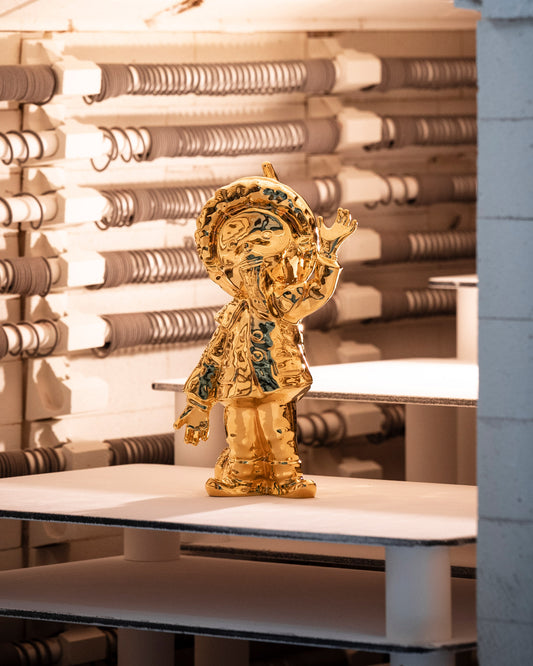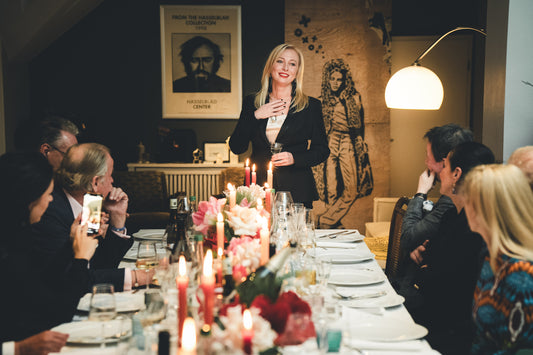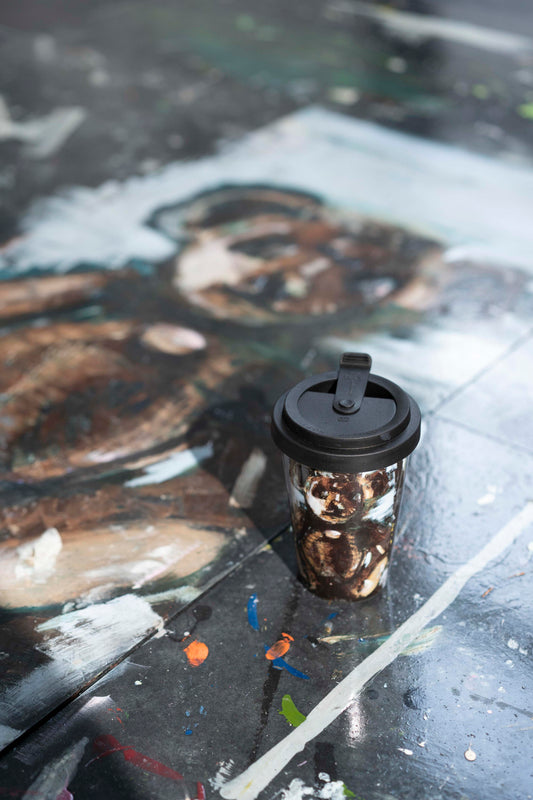LEGENDS OF LUXURY
Two traditional brands – one passion: Mercedes-Maybach and the Royal Porcelain Manufactory Berlin are united by a love of craftsmanship, innovative design and the highest level of perfection. Both are world-famous German brands and legends of luxury. They feel committed to their great tradition and at the same time continue to develop. In this way, they give the respective zeitgeist something special and awaken an enthusiasm that remains alive for generations. The historic Maybach models are now sought-after collector's items and the new Mercedes-Maybach S-Class completely redefines automotive luxury.
KPM Berlin looks back on almost 260 years of company history. The best-selling collection to date is the KURLAND, designed in 1790, and the most successful new product is the first KPM to-go cup as a sustainable and stylish alternative to disposable products. For Mercedes-Maybach and KPM Berlin, luxury is something both rare and desirable. It's all about exquisite materials and perfect workmanship - about the inherent beauty that must flatter the senses. And it's about attitude - about longevity in a world of throwaway mentality and breathless mass production. The designers fine-tune what their hearts are set on. An interview about luxury, tradition and sustainability with Gorden Wagener, Chief Design Officer Mercedes-Benz Group AG, and Jörg Woltmann, owner of the Royal Porcelain Manufactory Berlin.
Both KPM Berlin and Maybach look back on a long history. Could you please briefly outline the history ?
Jörg Woltmann: The Royal Porcelain Manufactory Berlin was founded in 1763 by Frederick the Great - so it has existed for almost 260 years. After the death of Frederick II, the company was passed down from generation to generation in the Prussian royal family and was owned by a total of seven kings and emperors. I took over in 2006. On the one hand, I would like to preserve the porcelain factory as a valuable and traditional cultural asset. On the other hand, we act like a start-up: we are innovative, creative and constantly reinvent ourselves in order to lead the company into a successful future.
Gorden Wagener: The Maybach brand has stood for the ultimate in automotive luxury for a hundred years. And the new Mercedes-Maybach S-Class continues this tradition. With the repositioning of the Mercedes‑Maybach brand in 2014, we inherited a great legacy and took on a great responsibility from Wihelm Maybach. Nevertheless, I think we have managed to define an automotive luxury with the new Mercedes-Maybach brand, which represents - as we say in English - Sophisticated Luxury: a beautiful, stylish, tasteful, automotive luxury. And this has been a huge global success so far.
What sets KPM Berlin apart?
Woltmann: KPM Berlin stands for the highest quality and craftsmanship. It has always been a manufacturer that produces its porcelain products almost exclusively by hand and creates a wide variety of decors from minimalist monograms to naturalistic and realistic images in freehand painting. 25 manufacturers work on a white cup, there are 29 complex and time-consuming work steps and the production takes 14 days. The cup goes through ten quality controls.
And what characteristics do customers value about Mercedes‑Maybach?
Wagener: With Mercedes‑Maybach, our customers get perfection in every dimension. Perfect proportions, the perfect implementation of our house style, the sensual clarity that is so significant for the brand. The combination of technology and design and of course the many custom-made handcrafted elements.
What does luxury mean to you, Mr. Woltmann?
Woltmann: Our porcelain is a luxury product that represents a high, timeless value for our customers. Luxury appeals to people who love culture and real values. They appreciate the style-defining design, the high quality and the craftsmanship of our porcelain and enjoy it for a long time, often for a lifetime and across generations. And as a manufactured product, our porcelain gives you what we are all short of: time. It invites you to spend and enjoy time together with family and friends. Our products also offer a sensory experience, primarily visual of course. Because their special aesthetics immediately catch the eye and enrich the environment. But our porcelain also offers significant added value in terms of feel; when you touch it, you can feel its value. The sense of taste in particular makes the crucial difference. Because coffee simply tastes much better from a porcelain cup. That's real luxury for me.
How do you make luxury a reality for customers at Mercedes‑Maybach, Mr. Wagener?
Wagener: For our customers, Mercedes-Maybach stands for “haute couture” in automobile construction. It radiates freedom, inspiration and style. A style that is, as I said, tasteful, beautiful, subtle. Materials, precision in details. We call it hyper-analog, like a chronograph, mechanical precision, coupled with - in our time - digital precision, the latest technology, of course from Mercedes. And that, in my opinion, is the pinnacle of what you can give a customer in terms of automotive and luxury experiences.
Sustainability is a central issue of our time. Are luxury and sustainability compatible?
Woltmann: Many luxury products impress above all with their timeless, discreet style, high quality, technical perfection, longevity and value retention. Seen this way, luxury and sustainability go hand in hand. For example, we have developed a to-go cup - a product that is not thrown away but is used again and again. Sustainability in luxury means valuing things and keeping them longer, paying attention to quality and not quantity. For us it also means producing sustainably. We rely on natural raw materials, short delivery routes and careful use of natural resources. For this purpose, for example, we transfer the waste heat generated during porcelain production into the Berlin district heating network. Our products provide around 150,000 hot showers in Berlin every year. And this type of energy recovery is CO2-free.
How do Mercedes-Maybach and sustainability fit together?
Wagener: The best sustainability in design is longevity, timelessness. A Mercedes‑Maybach is like a work of art: you buy it and it grows on you and it remains young, fresh and timeless. And that is the best sustainability. Like this coffee cup: We all know the paper cups that are thrown away after use. This is made of porcelain, reusable and lasts a lifetime - and this is also a good example of a Maybach automobile.
What parallels do you see between Maybach and the KPM?
Woltmann: Only those who have mastered their craft perfectly can create perfect masterpieces of lasting value. When we make people aware of unique luxury products and they come into contact with them, they feel a special appreciation for them. This applies to the porcelain from KPM Berlin and certainly also to the cars from Maybach. Because they embody high quality, craftsmanship, style and luxury down to the last detail. By the way, cars are my great passion. I am happy every time I look at my rarities: for example a Mercedes 300 SL from 1960 or a very beautiful Mercedes 300 SC Coupé from 1956.
THE ART OF NOBLE CRAFT
For both luxury brands, the cornerstone in the development of a new product, even in the digital age, is the traditional, hand-made clay or plaster model.
The Mercedes designers produce a 1:4 clay model of each variant of a new automobile based on their sketches and renderings in parallel with virtual models. For a better look, the model is painted or covered with foil. This is the only way you can decide whether your designs will have the desired effect in three dimensions. They then build a 1:1 model by hand that reveals all of the characteristic features of the new automobile. They also create a 1:1 clay model for the interior design based on drawings and renderings. They meticulously model all the details until an aesthetically high-quality feeling of space is created. All materials and colors are presented in series geometry, thus enabling a holistic assessment of the interior with regard to geometry and surface.
PAINTING BY HAND: ONE WEEK FOR ONE VEHICLE
Experts with years of expertise apply the exclusive two-color paint with a delicate dividing line by hand according to the highest quality criteria. This can take up to a week per vehicle. In series production, a Mercedes-Maybach receives the first coat of paint, the base coat, automatically. Then the body goes to the special paint factory. There the entire vehicle is sanded matt by hand.
TO PERSON
Gorden Wagener was born in Essen in 1968. After studying industrial design at the University of Essen, he specialized in transportation design at the Royal College of Art in London. Before he started at what was then Daimler‑Benz AG in 1997, he worked as an exterior designer for Volkswagen, Mazda and GM. He is Chief Design Officer of Mercedes‑Benz Group AG and responsible for the design of Mercedes‑Benz Cars & Vans.
His internationally positioned team designs all of the company's brands and products - from automobiles to the holistic corporate design of all group brands. Gorden Wagener is Prof. hc of the Moholo-Nagy University of Art and Design in Budapest and Dr. hc from Sofia University of Technology. He is committed to passing on his knowledge to future generations of designers. He also regularly realizes projects with other designers and artists. In 2020, together with the fashion designer Virgil Abloh, he created the “Project SUV”, which caused an international stir. A replica of the design study was auctioned as part of “Sotheby's Contemporary Curated”. Proceeds went to the Virgil Abloh™ Post-Modern Scholarship Fund, which supports academically promising fashion students of Black, African American or African descent.
Jörg Woltmann was born in Berlin in 1947. Immediately after completing his studies in 1972, the trained banker and business economist became a partner in the Dr. Stange & Co. Independent financial and audit consultancy. In 1979, together with his partner, he founded the private bank ABK Allgemeine Officials Bank AG, where he is now the sole shareholder and member of the board. In February 2006 he took over the Royal Porcelain Manufactory Berlin as sole shareholder. He is also the owner and operator of four hotels in Berlin, Potsdam and Thuringia. In 2011, Jörg Woltmann was awarded the Federal Cross of Merit and in 2015 he was awarded the Order of Merit of the State of Berlin. In 2016 he founded the Royal Porcelain Manufactory Foundation.
Further information from Mercedes-Benz is available at www.mercedes-benz.com .
Image credit: Benjamin Zibner


